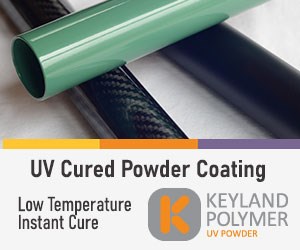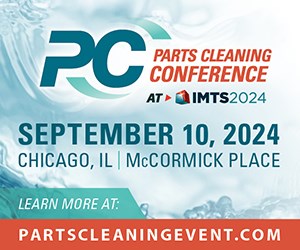Author: Time for EPA to Lead in 'Real World' Safety Standards
"I implore our new administration in Washington to take the lead and bring good sense and reason back into the regulatory process."

Steve Marcus is chairman of Markee International Corp. and a former columnist for Products Finishing. Contact him at steve@markee.com
I have just attended a very well-presented seminar at the Parts Cleaning Expo at PMTS 2017 in Columbus, Ohio. The speakers were well informed and included leaders in the metalworking chemical field as well as two well qualified speakers from the EPA.
I came away feeling both sick and angry. I don’t propose myself as a person qualified to address the detailed specifics of analytical chemistry, but I am one of billions of people who are affected by the dictates of the regulatory agencies of the world. This is my take on an out-of-control situation.
A case in point was a presentation by an EPA spokesperson who explained about many chemicals now being reviewed for possible use regulation or outright banning. The chemicals were various solvents that have been in use for many years. Those include n-propyl bromide. Some sort of controlling regulation can be expected for this and similar solvents in the near future.
An industry representative then spoke on research that is being done with n-propyl bromide to expand on the EPA findings. There is room for debate in this instance, and I’m sure the producers will work diligently to prove their point. That is as it should be.
My reaction, however, addresses the methodology that is being employed to make economically devastating decisions. In the particular case of n-propyl bromide, we were shown data from a two-year study. The starting point for research was approximately 2.5 to 3.0 times the concentrations of that chemical that can be found in the real world. From that point, the research went to greater and greater concentrations. There was no testing done at realistic concentrations. What a waste of time and money!
Here is the point: None of the research done was based on real world situations. So, a very useful and cost-effective chemical may be banned when there is no real world evidence, and no tests conducted in real world conditions, to make this decision. No evidence was presented to show significant health hazards resulting from the proper use of that chemical.
A case I am more familiar with relates to boron compounds. There is currently a move to restrict, if not eliminate, the use of many boron compounds from industrial use. This is, once again, based on research that has nothing to do with real life situations. Perhaps no element, or compound, has undergone more real world testing than boron and its many iterations. Boron is in sea water all over the world. Everyone who eats salt water fish, or swims in the ocean, or breathes air near the ocean, is ingesting, breathing, or absorbing boron. This has gone on for millions of years.
Boron is common in powdered laundry detergents, hand cleaners, diaper “sweeteners,” eye drops and other products, and it has been used daily by millions of people throughout the world for many decades. It is safe to say that there have been over a trillion human exposures to boron and its compounds. Where is the evidence that this has been harmful enough that it should be banned or restricted?
The value of boron in industrial compounds is significant. It is an effective rust inhibitor for ferrous parts; it retards bacterial growth in sumps; it acts as an anti-weld lubricant, improving tool life and performance; and, it is inexpensive. The economic value to industry, and the benefit to worker health is very significant.
As I write this, there are no doubt many new restrictions being proposed by dozens of agencies you are already familiar with—and don’t forget to include REACH. Each restriction will further reduce the quality of life for the world’s population by reducing the resources to create employment and make cost effective products. The unacceptably high unemployment rate in Europe can be traced, in part, to overreaching regulations and exaggerated health concerns.
I do not propose making unsafe products or misusing chemicals. Our company is dedicated to operator safety and environmental responsibility. I do propose that we use common sense, and that we set standards based on real world measurements.
It is time for the United States, through the EPA and other agencies, to lead the world in establishing real world safety standards. It seems we have been following, not leading, regulatory policymakers in the world who have been unduly influenced by unrealistic testing methods and political agendas. I implore our new administration in Washington to take the lead and bring good sense and reason back into the regulatory process.
Related Content
NASF/AESF Foundation Research Project #122: Electrochemical Approaches to Treatment of PFAS in Plating Wastewater - 9th Quarterly Report
The NASF-AESF Foundation Research Board selected a project addressing the problem of PFAS and related chemicals in plating wastewater streams. This report covers the ninth quarter of work (January-March 2023). In this report, we describe our work on evaluating the performance of PFAS degradation by electrooxidation using surface fluorinated Ti4O7 anodes in batch mode.
Read MoreUltrafiltration Membranes, Filter Elements for Improved Industrial Water Reuse
Ultrafiltration membranes help with water reuse in a variety of applications.
Read MoreFilter Press Troubleshooting and Optimization
Zachary Beckman of Haviland Enterprises Inc. discusses proper filter press maintenance for optimization of wastewater treatment systems.
Read MoreNovel Wastewater Treatment Targets Micropollutants
Swiss wastewater treatment technology provider Oxyle specializes in advanced wastewater treatment for removal of highly persistent micropollutants such as PFAS.
Read MoreRead Next
Episode 42: An Interview with Robin Deal, Hubbard-Hall
Hubbard-Hall wastewater treatment specialist Robin Deal discusses the latest trends in wastewater management.
Read MoreThe 2024 Ford Mustang: All the Colors Available
Although Chevrolet has announced the end of the Camaro and Dodge is offering “Last Call” editions of the Charger and Challenger, the Ford Mustang is launching to its seventh generation.
Read MorePowder Coating 4.0: Smarter, Faster, More Efficient and Connected
New tools reduce cost and waste, lower manufacturing footprint of powder coating operations.
Read More

























